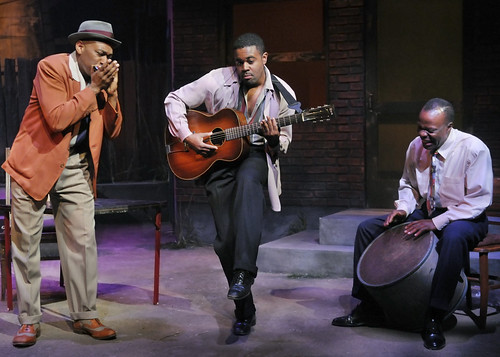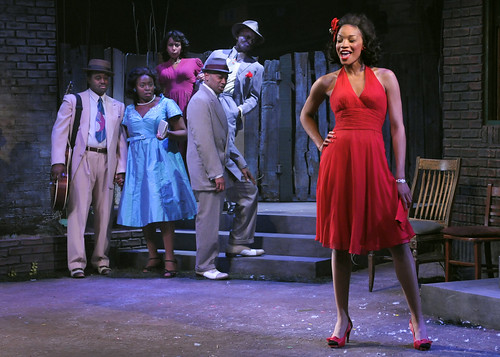Seven Guitars, ably played
Marc Damon Johnson (left), Tobie Windham (center) and L. Peter Callender star in the Marin Theatre Company production of August Wilson's Seven Guitars. Below: Shinelle Azoroh (right) is Ruby, who struts her stuff in front of the rest of the cast (from left) Tobie Windham, Omoze Idehenre, Margo Hall, L. Peter Callender and Marc Damon Johnson. Photos by Kevin Berne
Marin Theatre Company's beautiful production of August Wilson's Seven Guitars is the third I've seen, and it amazes me how similar and how different those productions have been. The first was in 1995 when American Conservatory Theater hosted the Broadway-bound version of the show as part of its season. The distinctive thing about that night of theater was the overwhelming wash of lyrical language that poured from the stage. For 3 ½ hours. I called it "indulgent" and "overly long" in my review for the Bay Area Reporter, but I also called the writing "lucid and full of gorgeous natural rhythms." Of Viola Davis' performance as Vera, of whom I wrote, "One of the play's best scenes occurs early in the first act when Vera gives Floyd every reason she can think of why she won't take him back. She does take him back, of course, but her aching, shattering litany – brilliantly delivered by Davis – is probably the truest torch song that was never sung on stage."
The Lorraine Hansberry Theatre produced Seven Guitars in 2003 under the direction of the late Stanley Williams, and by then the show had been trimmed to a more manageable three hours, and in my review for the Oakland Tribune, I commended the ensemble (seven characters, hence the title) when they were able to "revel in the beats and rhythms of Wilson's almost-musical writing."
And now Marin Theatre Company, tackling its first August Wilson play, enters the fray with special attention to the music. Director Kent Gash had the good sense to hire Bay Area folk music legend Linda Tillery to help shape the bluesy sounds of the show, which takes place (like most of the plays in Wilson's mammoth 10-play Century Cycle) in Pittsburgh's Hill District. The year is 1948, and one of the characters, Floyd "Schoolboy" Barton, has had a surprise radio hit with the bluesy "That's Alright." Music erupts spontaneously throughout Wilson's drama, and the ensemble must play together with Wilson's lyrical tapestry of words and individually on some of the most exquisite solos – arias almost – in the Wilson canon.
Tillery's work here is sublime, and you leave the theater fully convinced that words and music can combine in powerfully emotional ways both in and out of songs, in the cadence of poetry and in the rhythm of everyday language.
The look of Gash's production is also quite stunning. The central playing area of J.B. Wilson's set is a realistic courtyard between brick buildings, and Kurt Landisman's lighting goes mostly for realism except for some extreme moments of theatricality when characters are caught in a solo spotlight. Surrounding the real-world playing area is a patchwork mural reminiscent of the paintings of Romare Bearden. And there's a sumptuously lit backdrop of the Hill District behind the set that allows streetlights and houselights to hover somewhere between reality and artistic fantasy.
There's not much action in Seven Guitars beyond some romantic shuffling, some smalltime crime, lots of longing and more than a few hints of mysticism. So without heavy plot, Wilson's plot relies heavily on character detail and group interactions. Gash's ensemble is fantastic: Margo Hall, L. Peter Callender, Marc Damon Johnson, Omoze Idehenre, Charles Branklyn, Tobie Windham and Shinelle Azoroh. Each actor has at least one moment of transcendence, and that fact alone makes this show worth seeing.
The night I saw Seven Guitars, real life interfered with theater. A gunman holed up in a hotel room had closed the Richmond Bridge and wreaked havoc on Bay Area roads, especially in Marin County. One of the actors coming from the East Bay was stuck on a bus trying to cross the Richmond Bridge, which was shut down for hours. The 7:30pm curtain time came and went, and MTC's producing director, Ryan Rilette, came out to inform the audience of the situation. The actor was going to be fetched from the bus stop in San Rafael, but in all the traffic mess, the car sent for him had been in an accident. So the actor was in a cab on a slow crawl to the theater.
Rilette handled the situation perfectly. With the audience's permission, he moved the post-show discussion to a pre-show position. He introduced the play and placed in the wider frame of Wilson's cycle of plays about African-American life in the 20th century. He took questions and offered patrons free coffee or water from the snack bar. Some audience members chose to bail, which was understandable as they were facing a late-starting three-hour play.
But for those of us who stayed, the play offered rich rewards. I suspect the pre-show tension threw the actors a little. Ensemble rhythms were somewhat off, but the solo moments were spot on – especially Hall's humorous ramble as Louise.
I also have to mention Branklyn's turn as Hedley, the play's spiritual connection. Branklyn played the same role eight years ago at the Lorraine Hansberry, and in that production, his performance was out of synch with an ensemble that wasn't fully in control of the language. Here, his performance is infinitely more incisive and compelling.
Seven Guitars is a tough play, full of small, deeply connected details that add up to a brooding portrait of hope and desperation in the middle of the 20th century. Marin Theatre Company production is good enough that it leaves you wanting more. Perhaps the other nine plays in the cycle?
FOR MORE INFORMATION
August Wilson's Seven Guitars continues through Sept. 4 at Marin Theatre Company, 397 Miller Ave., Mill Valley. Tickets are $34-$55. Call 415-388-5208 or visit www.marintheatre.org.

